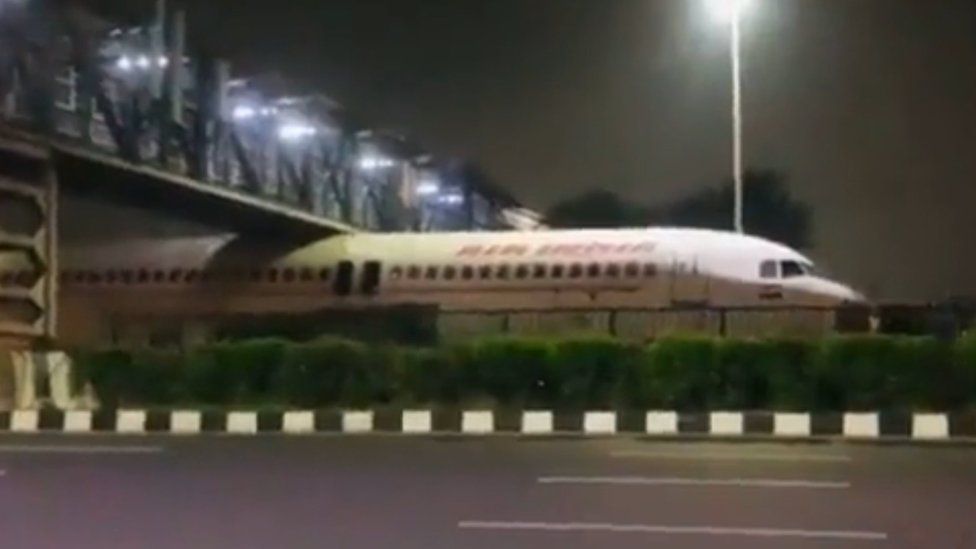


India's Deputy Civil Aviation Minister has revealed that there have been almost 1000 hoax bomb threats made to the country's airlines this year, nearly 10 times more than the previous year. These false claims, which are mostly made through social media, have resulted in diverted planes and rising costs for airlines. Despite the high number of threats, no actual danger has been detected.
Hoax Bomb Threats: A Rising Threat to Indian Aviation
Indian authorities have sounded the alarm over a surge in hoax bomb threats targeting airlines in the country. According to India's Deputy Civil Aviation Minister, there have been nearly 1,000 such threats this year, a sharp increase from the 100 reported in the previous year.
Background
Hoax bomb threats have been a recurring problem in India for several years. In 2018, a series of such threats led to the diversion of multiple flights and created widespread panic among passengers and airlines. The following year, a hoax threat forced the evacuation of the Indira Gandhi International Airport in Delhi, causing major disruption to air travel.
Modus Operandi
Most hoax bomb threats are made through social media platforms, such as Twitter and Facebook. In many cases, anonymous callers have made phone calls to airlines or airport authorities claiming to have planted bombs on board flights. These claims have often been false, leading to wasted time, resources, and heightened anxiety.
Impact on Airlines
The surge in hoax bomb threats has had a significant impact on Indian airlines. Each threat requires a thorough investigation and diversion of the aircraft to a safe location. This can result in costly delays, flight cancellations, and increased security measures. The additional expenses incurred by airlines as a result of these threats are passed on to passengers in the form of higher airfares.
Consequences
Despite the high number of threats, no actual bombs or explosives have been discovered in any of the incidents investigated. This has led to concerns that the hoax threats are being used as a tool for extortion or to create panic. Law enforcement agencies are actively investigating the source of these threats and have arrested several individuals in connection with them.
Top 5 FAQs
1. What is a hoax bomb threat? A hoax bomb threat is a false claim that a bomb has been placed somewhere, typically made with the intent to cause fear or disruption.
2. How are hoax bomb threats made? In the case of India, most hoax bomb threats are made through social media or anonymous phone calls.
3. What are the consequences of making a hoax bomb threat? Individuals who make hoax bomb threats can face serious legal consequences, including imprisonment and fines.
4. What happens when a hoax bomb threat is received? When a hoax bomb threat is received, authorities typically initiate a thorough investigation, which may include diverting the aircraft and conducting security checks.
5. How can passengers stay safe when hoax bomb threats are made? Passengers are advised to remain calm and follow the instructions of airline and airport staff. They should report any suspicious activity or receive threats to the authorities immediately.

As the counting for the local body elections in Kerala began, the Congress-led UDF is in the lead in most of the city and town local bodies. This two-phase election, held on December 9 and 11, has seen a high voter turnout of over 70%. The results of this election will have a significant impact on the political landscape ahead of the 2026 Assembly elections in Kerala, with local body results often reflecting voter mood. Congress president Mallikarjun Kharge has expressed confidence in the UDF alliance's chances in the upcoming Assembly polls.

R Sreelekha, the former DGP and BJP's mayoral candidate in Thiruvananthapuram Corporation, secured a victory in the Sasthamangalam ward and pledges to deliver a corruption-free administration if given the chance to serve the public. Other notable victories in the corporation elections include former district president VV Rajesh and UDF mayoral candidate KS Sabarinathan. However, some high-profile defeats were seen, including actor Poojapura Radhakrishnan and Congress leader Johnson Joseph. Independent candidate Pattoor Radhakrishnan and Congress candidate Mary Pushpam also emerged victoriously in their respective wards.

According to sources, the Special Intensive Revision (SIR) exercise in West Bengal has identified a total of 58,80,202 voters who may be excluded from the draft voter list. This includes people who have passed away, transferred, missing, and identified as 'fake' by the Election Commission. These numbers are subject to change in the final list, which is set to be published on February 14, 2022. The commission has divided voters into three categories - own mapping, progeny mapping, and non-mapping - depending on their presence in the 2002 voter list. Those not falling into any of these categories will be called for a hearing by the EC.

In a significant shift in voter sentiment, the Congress-led United Democratic Front (UDF) is set for a decisive win in the Kerala local body elections, dealing a major setback to the ruling CPM-led Left Democratic Front (LDF) ahead of the 2026 Assembly elections. The UDF has consolidated its gains across urban local bodies, while the LDF's last-minute welfare push failed to curb anti-incumbency. The NDA also made significant gains, underlining its expanding presence in urban Kerala.

In a major upset, the BJP-led NDA has won the Thiruvananthapuram Municipal Corporation, ending the CPI(M)-led LDF's 45-year reign. The victory, with the NDA winning 50 out of 101 seats, is a boost for BJP's aspirations in Kerala's upcoming Assembly elections. The party's strong focus on development and Hindutva in Thiruvananthapuram, under the leadership of state unit president Rajeev Chandrasekhar, proved successful despite challenges faced during the campaigning. This victory has put the BJP in a strong position for the 2021 Assembly elections.

The Bharatiya Janata Party-led National Democratic Alliance (NDA) has taken a huge lead in Thiruvananthapuram Municipal Corporation, giving a setback to the ruling Left Democratic Front (LDF). Initial trends show the NDA leading in 25 wards, while the LDF is ahead in 15 wards and the UDF in 10 wards. This is a major blow to the LDF ahead of the upcoming assembly elections in Kerala, with a record voter turnout of 73.69%. The State Election Commission has also commended the peaceful conduct of the elections.

In the ongoing Kerala local body elections, the NDA, led by the BJP, has made a significant jump by winning or leading on 29 out of 101 wards in the Thiruvananthapuram Municipal Corporation. This is a significant increase from their 2015 performance, where they won only 33 wards. Meanwhile, the LDF, which had a strong hold in the corporation, has faced a setback with only 15 wards in their favor. This shift in dynamics has sparked discussions about the LDF's performance under Chief Minister P Vijayan's leadership.

Indian leaders from across party lines paid homage to the security personnel who lost their lives defending the nation's democratic institution in the 2001 Parliament terror attack. A solemn tribute ceremony was held, with Prime Minister Narendra Modi and Congress leaders Sonia Gandhi and Rahul Gandhi, among others, laying floral wreaths. The President and Prime Minister also paid their respects, while the CRPF paid special tribute to a constable who was posthumously awarded the Ashoka Chakra for her bravery during the attack.

The Supreme Court has put a temporary hold on the Kerala High Court's ruling that 404.76-acre Munambam land is not Waqf property. This came after a Special Leave Petition was filed by the Kerala Waqf Samrakshana Vedhi, which contested the High Court's verdict. The Court clarified that despite the stay, the State Government was right in appointing a one-member Judicial Commission to probe the history and nature of the land. Local residents, however, have opposed the petition and argued for their right to the land.

The Andhra Pradesh State Cabinet, chaired by Chief Minister N Chandrababu Naidu, approved a wide range of proposals in the fields of urban development, industries, energy, tourism, infrastructure, and welfare. These decisions are expected to attract an investment of over Rs 25,000 crore and create more than 1.1 lakh jobs. The Cabinet also approved a 3.64% hike in DA/DR for government employees and pensioners, and other initiatives such as the reconstruction of check-dams and the upgradation of teachers in tribal welfare schools.